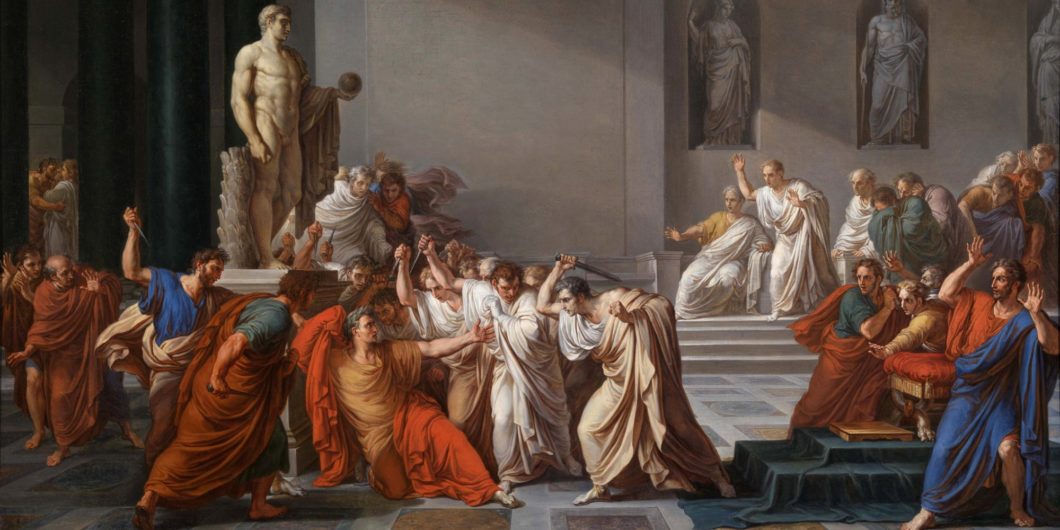Ancient Liberty, Modern Divisions
When classical liberal scholars think of libertarianism, they generally think of an evolved political concept centered around self-governance. To them, recent demonstrations against lockdowns and police brutality both have a point. However, many self-described libertarians took part in the lockdown protests but opposed the protests against the police—and vice versa. This divide reflects a difference in understanding of what liberty means that goes back to at least the Roman Republic.
When Caesar’s assassins struck, their first cry was “Libertas!” In Shakespeare’s telling, after Caesar falls, Cinna proclaims, “Liberty! Freedom! Tyranny is dead!” The event resounds throughout the history of the concept of liberty. The Virginia state flag shows the fallen personification of Tyranny beneath a triumphant Virtue, and a line attributed to Brutus—sic semper tyrannis; thus always to tyrants.
Yet what did the Twelve mean by “Libertas?” That is a telling question. The great historian of the Roman revolution, Sir Ronald Syme, called it “a vain and negative freedom—freedom from the rule of a tyrant or a faction.” He concluded that it was “a convenient term of political fraud . . . most commonly invoked in defense of the existing order by individuals or classes in enjoyment of power or wealth.” Using surprisingly modern terms for 1939, he felt libertas meant “the perpetuation of privilege.”
In more modern research, Valentina Arena of University College London has identified a difference in the definitions of libertas that emerged between the two ever-shifting factions of Republican Rome, the optimates and the populares. The optimates, she finds, used libertas to mean the freedom guaranteed by Rome’s mixed constitution. The populares, on the other hand, focused on the traditional formulation of libertas populi to argue that any political arrangement that did not give preference to the people over elites was no freedom at all.
Caesar, of course, was the consummate popularis. His assassins were generally of optimates background, even if they had reached an accommodation with him or had been recipients of his characteristic clemency. So, the liberty they fought to defend was in fact the continuation of their privileges. For instance, their outrage at Caesar’s cavalier treatment of the consulate was at least partly about the diminution of their sense of self-worth as aspirants to that great office. The dictator, to their dismay, had directed his efforts at improving the lot of the people, as was demonstrated in his will, even if, as Matthias Gelzer put it, he regarded demagogy as a means to an end.
An American liberty that sees its cops not as soldiers, but as guardians of ordered liberty, should be a liberty that all can agree on.
As testimony to the staying power of ideas, we see a similar divide playing out today, even if the social positions have switched. The middle-class “Gadsden Flag” libertarians, for want of a better term, (and even Dixie flag libertarians) are arguing for a liberty that secures their heritage—and yes, their privileges. The more bookish libertarians, generally of higher social status and fewer in number, are arguing for a liberty that breaks down those traditions and privileges and empowers the underprivileged within a constitutional framework, as the populares did—even if their champion Caesar stretched that framework to its breaking point.
Yet today’s optimates should remember what happened after the assassination of Caesar. After great upheaval came the ascension of Octavian to the Principate as Emperor Augustus. Even as he made himself emperor and accrued all the trappings of constitutional governance to himself, Augustus was able to proclaim res publica restituta—the Republic is restored. The optimates’ definition of libertas lost out. This was the process of the Roman revolution.
It would be foolish to suggest that revolution is inevitable, but we can learn from the ancients that when mutual agreement on the meaning of concepts like liberty starts to break down, there will likely be conflict. It behooves both camps to try to understand one another.
The Gadsden Flag libertarians need to understand that bookish libertarians simply want to improve the lot of those who have gotten a raw deal from the institutions the Gadsden libertarians seek to defend. The bookish libertarians need to understand the value the Gadsden libertarians see in those institutions and recognize that when people feel their way of life is threatened they are liable to react harshly.
The synthesis of this mutual understanding could be of benefit to both. An American liberty that sees its cops not as soldiers, but as guardians of ordered liberty, for instance, should be a liberty that both can agree on. Similarly, if American liberty is centered on a constitutional order and its institutions, both sides should agree that an over-mighty executive should be restrained by Congress and courts, even if that means a popular executive doesn’t always get his way.
The American tradition of liberty has long encompassed both Roman interpretations of the term. It would be a tragedy to see us repeat the mistake of the Senate and People of Rome in allowing the difference in interpretations to divide us.


